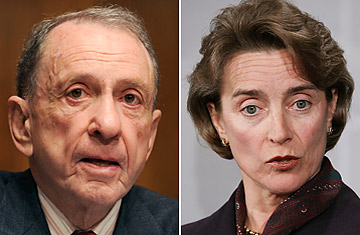
Senators Arlen Specter and Blanche Lincoln
(2 of 2)
For years, the GOP had no use for Specter because of his regular support for Democratic legislative efforts and presidential nominees and his opposition, at about the same rate, to Republican causes. After barely surviving a primary fight six years ago with the strong support of his own party's establishment (including George W. Bush), Specter realized he could never get re-elected unless he crossed the aisle because the party base had come to detest him, and so he bailed.
Fiscal and social conservatives said good riddance. Right-wing activists crowed over chucking the archetypal RINO (Republican in name only) off their team, even as Specter's defection momentarily gave Democrats a 60-seat, filibuster-proof majority. Democrats including Obama and a host of liberal interest groups, who promised Specter they would support his re-election bid in order to lure him across the aisle, have dutifully lived up to their words. But the heavy betting throughout the political world is that Specter's craven switch has tainted him, that he is no more popular in his new party than he was in his old one, and that he is probably more out of step with the mood of the electorate than anyone else on the ballot this year.
If Specter loses, there won't be much sadness in any quarter. But, as always, the tendency among politicians is to learn the wrong lesson. Specter won't have been defeated just because he switched parties. If he loses, it will be because, as a devastating last-minute Sestak television ad says, he became a Democrat to "save one job — his, not yours."
Indeed, much of the bitterness across the country stems from a fundamental anxiety about jobs and the economy, and the belief that Washington isn't doing anything to fix things. Immigration, health care, deficits, taxes — all of these issues are, at bottom, connected to the short- and long-term concern that the U.S. lacks a serious plan for creating a solid economy for current and future generations. What Americans want and need are politicians who recognize their fears and grapple with the issues in a serious way, even at a time of extreme partisanship in our politico-media culture.
The example of the new government in England is both instructive and encouraging. There, two political parties whose core campaign platforms had scant overlap have already found a way to put aside personal and political differences to show an unhappy electorate that they can work together to solve problems.
No matter what the outcome in November, Obama won't be forced into a formal coalition government, of course, but he will be working with a chastened group of returning members of Congress and a bunch of newly elected freshmen. Between now and then, and certainly starting with a lame-duck session at the end of this year and the new session on Capitol Hill in 2011, the key will be understanding that what seems like anger is actually profound worry, and addressing its root causes.
It takes a bigger politician than Arlen Specter to understand that what matters in elective office is the lot of the citizens, not the politicians. Let's hope that whoever wins on Tuesday, and in November, gets that message.
